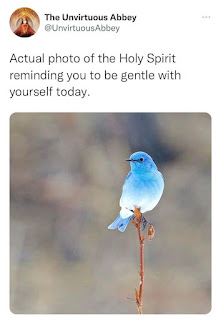The Fourth Sunday of Easter-The Rev Melanie Lemburg
4th Sunday of Easter-Year C
May 8, 2022
I’ve been hearing one particular
question more frequently over these last few weeks: “What are you going to do
on your sabbatical?” The conversation usually
proceeds along similar lines as I begin to share details of a family trip to
Europe that we have planned to kick-off my sabbatical and to celebrate our daughter’s
graduation from high school. I tell them
all the different places we’ll be going and what we plan to do there, and after
their initial enthusiastic response, their eyes start to glaze over. It’s a lot.
Once I realize this, I quickly wrap up and we talk about the rest of the
plans for what I’m going to do on sabbatical. (Don’t worry, I’ll be detailing
more of this for y’all in upcoming correspondence…) But after several versions of this
conversation, I began to sense some uneasiness within myself.
I
am not exaggerating when I tell you that I have spent months planning this
trip—where we’ll go and stay, how we’ll get there, what we’ll see and do when
we’re there. (I do love to plan trips—my
mom even gave me a bunch of guidebooks for my birthday this past
January….because that’s what I asked for!)
When I dig a little deeper, I begin to realize that the twinges of
uneasiness I am feeling are, perhaps, gentle pecks from the Holy Spirit to pay
attention. And when I dig deeper still,
I begin to see that I am bringing the same sort of violence (or dare I call it
sinfulness?) to my sabbatical that I often live with in my work and home
life.
Here’s what I mean by that. I’ve been re-reading a book titled Sabbath: Finding
Rest, Renewal, and Delight in our Busy Lives. It’s by a man named Wayne Muller, who had a
near death-experience through a serious infection during a time in his life
when he was dramatically over-working.
In his opening chapter, Muller writes this about sabbath keeping and our
modern lives: “Thomas Jefferson suggested that human life and liberty were
intimately entwined with the pursuit of happiness. Instead, life has become a maelstrom in which
speed and accomplishment, consumption and productivity have become the most
valued human commodities. In the trance
of overwork, we take everything for granted.
We consume things, people, and information. We do not have time to savor this life, nor
to care deeply and gently for ourselves, our loved ones, or our world; rather,
with increasingly dizzying haste, we use them all up, and throw them away…” Muller suggests that in all this, we have
forgotten Sabbath—a time that is set aside for sacred rest.
He continues, “Sabbath is more than the
absence of work; it is not just a day off when we catch up on television or
errands. It is the presence of something
that arises when we consecrate a period of time to listen to what is most
deeply beautiful, nourishing, or true.
It is time consecrated with our attention, our mindfulness, honoring
those quiet forces of grace or spirit that sustain and heal us….While many of
us are terribly weary, we have come to associate tremendous guilt or shame with
taking time to rest. Sabbath gives us
permission….We only need to remember.”[i]
Today, we are offered two different
reminders of how we might find this rest, take this refuge in Jesus. In our gospel reading for today, Jesus reminds
his listeners and us that none of his followers, his sheep, can be snatched out
of his hand; how we are all also held in God’s hand as well. At a different point in John’s gospel, Jesus
invites us to “make your home in me as I make mine in you.”
The second reminder comes from Dame
Julian of Norwich whose feast day is also today. Julian, a medieval mystic who lived in
England during a time of plague and political tumult, had a vision about the
nature of God’s love. And in this
vision, Julian saw God holding something that looked like the size of a
hazelnut in God’s hand. It was revealed
to Julian that this hazelnut was all that had ever been created by God, and she
realized three truths about her life, the life of others, and the life of all
creation: 1. God made it.
2. God loves it. 3. God keeps it.
We are already fully made, fully loved,
and fully kept by God. There is no
striving that we need to do or even that we can do in order to earn this. That offer of peace, of rest, of belonging is
already there. We just have to accept it,
and to open ourselves up to the delight that comes.
So, what does that look like? For me, it has meant more a change in
approach than a change in plans for sabbatical at this point. I’ve pulled back from trying to schedule out
every moment of our trip and have left open spaces for rest, for exploration,
for delight.
Your invitation this week is
two-fold. First, spend some time with
Dame Julian’s revelation: that God made
you; God loves you; and God keeps you. Second,
spend some time doing a time inventory.
Look at how you spend your time in a given week. What are ways that you are already keeping the
sabbath—whether it be for just a few minutes a day to whole stretches of
time? What are some ways that the God
who keeps you is inviting you into deeper, fuller sabbath rest in the coming
week?
[i]
Muller. Wayne. Sabbath: Finding Rest, Renewal, and Delight in our
Busy Lives. Bantam: New York, 1999, pp 4-8.

Comments
Post a Comment